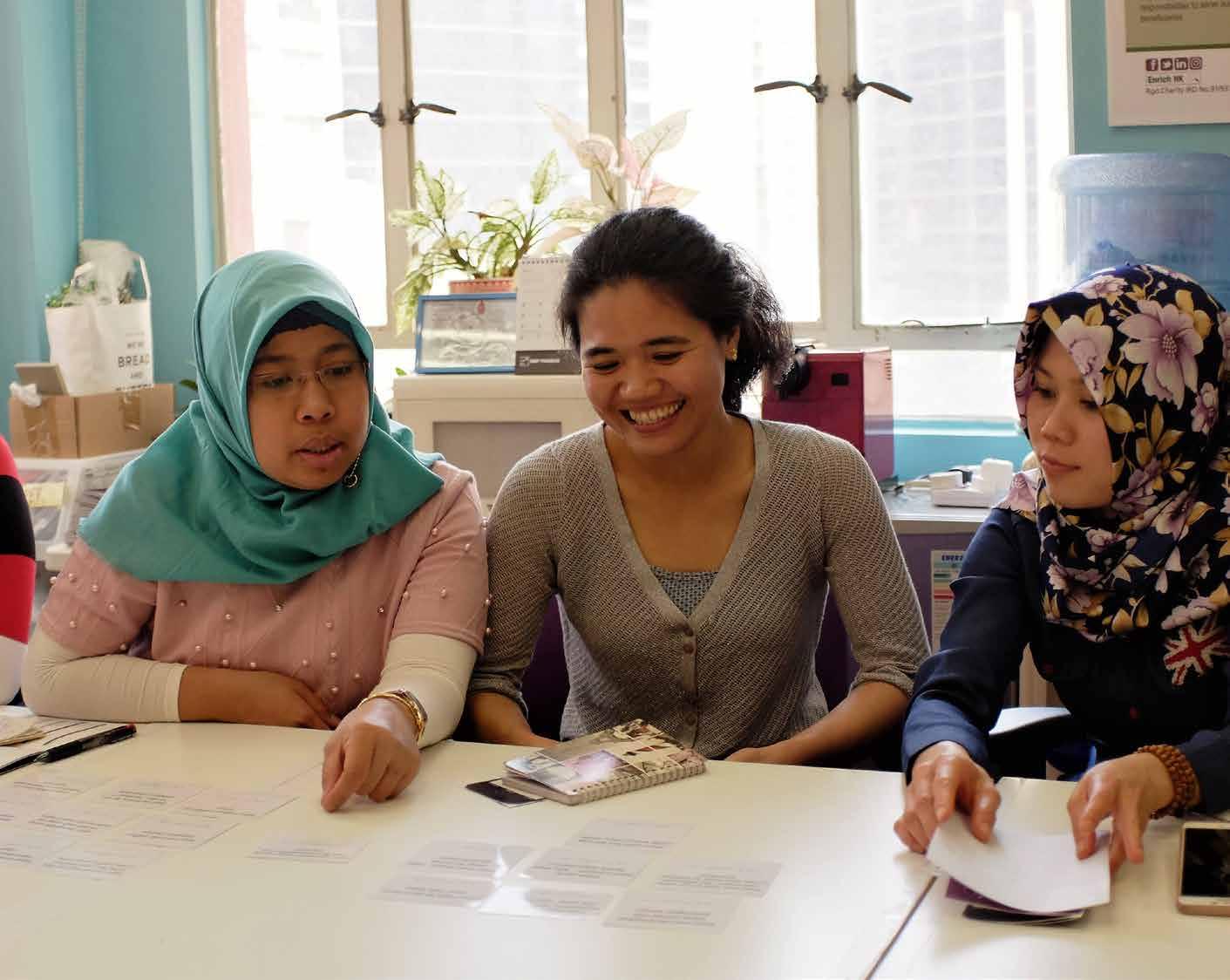
16 minute read
EDUCATION
Do you speak my language?
The benefits of bilingual education extend far beyond the acquisition of fluency in a second language. Elizabeth Jerabek reports
Raising and educating children in a culturally and linguistically dense community like Discovery Bay is a privilege but it can often feel overwhelming. Many of us would like our children to become fluent in two languages, for instance Cantonese and English, but this can seem like too big an ask, particularly if we are considering a totally immersive learning environment where the child’s second language (Cantonese or English) would be the language of instruction. Can children learn enough in a second language in order to succeed and do well in school? The short answer to that question is ‘Yes,’ though you need to be in it for the long haul – it can take five or more years for a child to master a second language. The next question, then, is, ‘Is it worth it?’ Will the long-term benefits children gain from being bilingual outweigh the challenges of getting them there?
Academic performance
One of the leading proponents of bilingual education is Dr Virginia Collier, Professor Emerita of Bilingual/ Multicultural/ ESL Education at George Mason University in Fairfax, Virginia. After years of teaching English as a second language in US public schools, Virginia – who grew up as an expat kid in Central America, speaking both her native US English and Spanish – set out to answer the questions: How long does it take non-native language learners to become academically able to do well in school in a second language, and what are the things that influence that process?
Virginia and her research partner Dr Wayne Thomas spent 32 years examining 7.5 million student records in their effort to answer these questions. They designed a longitudinal study that allowed them to follow the academic
progress of English learners of all language backgrounds from kindergarten through to the end of secondary school in 36 school districts in 16 US states. The results of their study, which was published in 2017, demonstrate that English-only and short-term transitional bilingual programmes close about half of the achievement gap between non-native language learners and native language speakers. In contrast, high-quality, long-term bilingual programmes in both the students’ first and second languages close the performance gap after five to six years of schooling.

The data also shows that students in these long-term bilingual programmes often do better in all of their academic subjects than do native language speakers who receive no bilingual training.
Developmental psychology research into bilingual education attributes better academic performance in bilingual students to enhanced development of three cognitive functions: executive control, theory of mind and episodic memory.
Executive control
The Harvard University Center on the Developing Child defines executive control as the cognitive processes that enable us to plan, focus attention, remember instructions and juggle multiple tasks. Like a stoplight at a busy intersection, the brain uses this skill set to monitor situations in order to filter distractions, prioritise tasks and control impulses. In other words, executive control is the brain’s ability to switch between tasks in order to prioritise the appropriate response to a set of stimuli while inhibiting inappropriate responses.
Bilingual students often outperform native language speakers in all academic subjects
Developmental psychologists believe that bilingual education helps stimulate the development of executive control as bilingual children have to continually monitor situations (such as which language is spoken when and by whom) in order to prioritise the appropriate response (speaking or responding in the situationally correct language), while inhibiting the inappropriate response (actively not speaking the other language). For example, a child may say goodbye to their mum in one language, but may say hello to their teacher and classmates in another language.
Bilingual education provides greater opportunities for children to strengthen their executive control skill set, which can help them later in life in more complex situations that may require greater self-regulation and emotional control in order to sustain attention to complete the tasks required to achieve a desired goal.
Theory of mind
Perhaps one of the most interesting abilities that begins to emerge during early childhood is children’s ability to appreciate the perspective of other individuals. This ability to appreciate another’s mental state and, as a result, to explain and predict another’s behaviour is known as theory of mind.
While executive control helps bilingual children monitor a situation and respond appropriately – I say ‘Goodbye’ to my mum in English but I say ‘Néih hóu’ to my teacher in Cantonese – theory of mind helps bilingual children socially understand which response is appropriate and why. When I say goodbye to my mum, I say ‘I love you’ because she’s my parent; but when I say goodbye to my teacher I don’t say ‘Ngo oi nei’ because my teacher is not part of my family.
Studies show that language competence in children predicts the development of theory of mind – and that the acquisition of theory of mind is delayed in children with specific language impairment. In other words, the better a child can communicate, the better they can understand social situations and the mental state of another.

According to a 2004 study of 31 bilingual and 29 monolingual pre-schoolers, bilingual preschoolers are better able to predict others behaviour in the future and they have a better understanding of why others behaved the way they did in the past. This ability may make it easier for bilingual students to understand when and why their teacher wants them to do something, and may make it easier for them to collaborate with and learn from their peers.
Episodic memory
In the same way that it may be easier for bilingual children to anticipate what might happen in the future based on the behaviour of others, it may also be easier for bilingual children to remember what has happened in the past. Psychologists categorise memory as either working memory or episodic memory. Working memory is active and relevant only for a short period of time, whereas episodic memory is longer lasting, it allows us to recall and re-experience a specific event or situation.
Research indicates that bilinguals may struggle to remember information from verbal episodes if they are asked to retrieve that memory in a language other than the one they used to form and encode the memory. But for nonverbal episodes, which may be encoded as memories through some other stimuli such as sight, taste, smell, or touch, bilinguals are at an advantage, likely due to better executive control.
In a 2012 study, designed to encourage the participants to encode a visual scene in their memory as a non-verbal episode rather than a verbal episode, bilingual and monolingual adults were asked to perform a picture recall task. Participants were shown a series of pictures depicting complex scenes that were not easily labelled or described, and the participants were not given much time to view each scene. Moreover, the participants did not know they would later have to recall the pictures, which decreased the chances of them labelling the pictures and using language as strategy to remember the scene later. The results of the study showed that bilingual participants recalled more pictures than monolinguals, and, within the bilingual group, early and more bilingual experience was associated with better recall.
Similar research indicates that that bilingualism can also protect against memory decline, since bilinguals who have Alzheimer’s tend to show memory-related symptoms at a later age than monolinguals.
So back to the original question: Will the long-term benefits children gain from being bilingual outweigh the challenges of getting them there? That’s for you to decide but I’m leaning towards a ‘Hai.’
Bilingual children are well-equipped to collaborate with and learn from their peers



Financial advice for migrant domestic workers from the team at Enrich HK!
Did you know that March is a really special month for us at Enrich HK? That’s because March 8 is International Women’s Day, celebrating the incredible achievements of women. While many companies in Hong Kong and around the world celebrate March as ‘Women’s Month’ to recognise the women in their workforce, we believe it’s important to also recognise that 98.5% of Hong Kong’s migrant domestic workers are women, who make huge contributions to our society. We celebrate and applaud you guys for all the incredible work that you do!
The campaign theme for International Women’s Day this year is ‘Choose to Challenge’ – highlighting the importance of challenging misconceptions and biases, so as to work towards gender equality. As women, you play multiple roles. Aside from being domestic workers, you are mothers, daughters, sisters, partners, entrepreneurs, leaders, teachers, and much more. This month, we want to explore how you can choose to challenge your circumstances and build confidence in yourself – because you have so much to be proud of.
Recognise your worth
‘I’m only a domestic worker.’ We hear this quite often from women who first join our workshops at Enrich. Let’s challenge this! Now, we know, of course, how important your work as a domestic worker is to support your family, but did you know that migrant domestic workers contributed a staggering HK$98.9 billion (yes, billion!) to Hong Kong’s economy in 2018
through the value of their work.
The work you do is absolutely crucial and Hong Kong would be a very different place without you. Many of your employers would not even be able to go to work without you around. You might have skills in elderly care, child-care, specialneeds care, pet care, house management, cooking, cleaning, tutoring children, first-aid, and so much more, and these are all extremely valuable.
Many women, whether they are domestic workers or CEOs, underestimate themselves. As women, we often feel like we’re not doing enough or that we’re not making a difference. But we are! What we really need is to believe in ourselves and recognise our value.
It’s time to challenge how you see yourself, and confidence is the key! Start off by changing how you talk to yourself. Have an affirmation that you repeat when you feel unsure. For example: ‘I have the power to change my life!’
You can also change the way you communicate with your family, friends and employer, so that you look and feel more confident. For example, make eye contact when you speak to show that you are actively listening and that you are interested. Practice standing up straight and tall – fear makes you try to look as small as possible. You look more confident when you hold your head up, and straighten your back and shoulders. Also, when you speak, use your hands purposefully – if you fidget or tap your feet, you appear less confident. Breathing deeply can also help you focus and stay strong. If you’re about to have a difficult conversation, or if you’re having a moment of self-doubt take a few slow, deep breaths. Most importantly, remember to set goals for your own development. Visualise what you personally want to achieve in the future, whether that’s to study further, own a business, or achieve a fitness target. Whatever it is, set the intention and save for it. You can use your time as a domestic worker to make your dreams happen. Isn’t that an empowering idea?
Know that you have rights
Over the years, we’ve seen how confidence and good financial management go hand in hand. If you have faith in yourself, you will feel empowered to take control of your finances, manage difficult scenarios and reach for your goals.
Let’s challenge how you see your role in the family. Start by thinking about yourself as a ‘breadwinner.’ Traditionally, this is a label that was most often given to men, but times have changed that. As a female domestic worker you probably earn more or as much as the men in your family. Many of you might even be the sole breadwinner in your family. That role is a stressful one, but it’s also empowering – you work hard to bring money in and you should have a say in how it is spent.
Now’s the time to have a confident, empathetic conversation with your family about money – discuss your goals with them, and try to understand their fears and concerns. Talk to your partner about the long-term benefits of working though these issues together - after all, the sooner you can achieve your goals, the sooner you can go home for good. An important lesson here is for you to learn how to say ‘No.’ If you think the money you are being asked for would be better saved or spent somewhere else, say so with confidence. If a certain expense is a ‘want’ and not a ‘need,’ say a kind, but firm ‘No.’
Many of our Enrich graduates have learned to draw clear lines when it comes to finances – they keep their savings in bank accounts in their own name, and ask their family to provide receipts for major expenses or even ask for a basic monthly budget before sending the remittance. This shows them where their money goes and how much their family actually needs. And it also teaches their partners and children back home about financial management.
At the end of the day, remember that as a breadwinner, you are a leader and you can choose to challenge your circumstances. Invest in yourself by joining classes which can help you learn better financial management or leadership. You’ve already overcome so much, especially with the difficulties of the pandemic, so know that you are strong and resilient. Happy Women’s Month!
Enrich HK is an award-winning Hong Kong charity providing financial and empowerment education to migrant domestic workers. For a free, confidential one-to-one financial counselling session and to learn about the courses on offer, visit www.enrichhk.org. If you have a question you would like to have answered on this page, email info@enrichhk.org.

FENG SHUI: Home office

If working from home is now your ‘normal,’ feng shui can help you reap the rewards. Samantha Wong reports
Surveys have long suggested that remote workers are more productive than their office-based peers. One of the reasons for this, as detailed in Stanford University’s How working from home works out (June, 2020), is that those of us who work from home find it more difficult to create a distinction between business and personal life, and we therefore put in more hours. The commute home, no matter how short, helps office workers switch off and draw a line under their working day. For remote workers this can be more of a challenge – and feng shui can help with that.
If your flat is big enough, your best plan is to set aside a ‘spare room’ as your home office. That way you can literally shut up shop at the end of the day – close your office door, and you’ll be less tempted to nip back to your computer after-hours. But what if your workspace is an add-on in an open-plan living room? A good option is to place your desk behind your sofa (so you don’t have to spend the evening looking at your in tray), or consider screening it off, either with a curtain or free-standing room divider.
What’s critical is that you avoid squeezing your desk into a corner of your bedroom – feng shui says you need to create as much distance as possible between the place where you work and the place where you sleep.
Decorate for success
Your home office mirrors your career and money coming in, so it’s important to design it right regardless of its size. As always, you need to start with the feng shui basics: unclutter your space (clutter drains your energy), improve your lighting system (especially if you often feel tired), and clear the air (stagnant air is demotivating). A ceiling fan will help get the sheng chi (beneficial energy) flowing, as will a couple of full-spectrum lights that simulate natural light, reducing glare, fatigue and eye strain.
When you walk into your home office, you need to feel energised and inspired. You are decorating your workspace with your success, wellbeing and productivity in mind, so include meaningful career memorabilia and family mementos that make you feel successful, appreciated and happy.
Green, the feng shui colour of wealth and success, is your go-to colour when decorating your home office. Use green on the walls and be sure to bring in a couple of green-leaved houseplants. The energy of plants will refresh not only the energy of your workspace but also your own energy. Know that jade, bamboo and all succulents are wealth-symbolic plants, and they represent creativity and growth.
Next up, there are three areas you need to activate in your home office to boost your career, and to do this you need a compass. Stand in your office and locate true north. This space represents your career, so decorate it with black or mirrored accessories. Now activate the southeast corner, representing wealth, by incorporating items that speak to you of money or introducing a plant. Boost the office’s south area, representing fame and

reputation, with anything red. Note that encouraging your pet to hang out in your office will also help you gain recognition because animals possess powerful red fire energy.
Desk placement
You need to prioritise comfort in your work space, so invest in an ergonomically designed chair and a solid feng shui-approved desk. Avoid glass desks, as feng shui says they are too unstable. Metal desks are great for focus, but they are cold and impersonal, so add a tablecloth or wooden bowl. A wooden desk will boost your creativity, but the wood element carries a frenetic, scattered energy, so place a cool, calm lepidolite crystal near your computer. This will help you concentrate, while also shielding you from electromagnetic pollution.
Now all you need to do is position your desk correctly. It needs to be in the powerful command position, diagonally opposite the door. If this is not possible, place it in the southwest of your home office. This is also a corner of power.
It’s important that your back isn’t facing the door when you sit at your desk. If you can’t see the door, you will miss out on opportunities and find that colleagues are talking about you behind your back. If for some reason you have to sit with your back to the door, place a mirror on your desk so you can see what’s behind you.
You want to have a clear view of the door but you don’t want to sit too close to it or right opposite it. Why? Because the energy that rushes in through a doorway is too strong. If you can’t comply with this rule, place a small bell near the door, or a plant between your desk and the door.
There should be a solid wall behind you to provide support. If you have your back to a window, you can stop the incoming energy stabbing you in the back by hanging a picture of a mountain or a tortoise beside the window. Importantly too, don’t face a wall, this will mean that you are facing obstacles. If there’s no other way to position your desk, create your own window by hanging a picture of an inspiring landscape on the wall in front of you. This will also serve you well if you follow the 20-20-20 rule – as you glance up from your computer screen every 20 minutes, you’ll have a beautiful ‘view’ to rest your eyes on.
A wooden desk promotes creativity, a plant boosts energy and a well-placed painting removes obstacles








